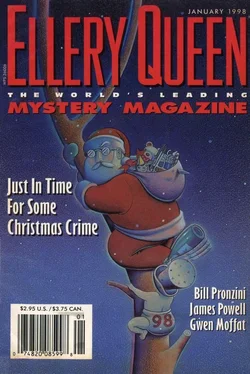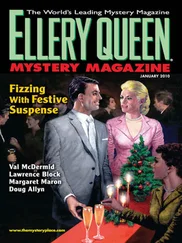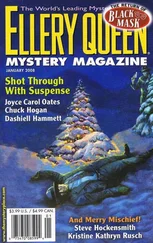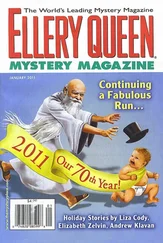Edward Hoch - Ellery Queen's Mystery Magazine. Vol. 111, No. 1. Whole No. 677, January 1998
Здесь есть возможность читать онлайн «Edward Hoch - Ellery Queen's Mystery Magazine. Vol. 111, No. 1. Whole No. 677, January 1998» весь текст электронной книги совершенно бесплатно (целиком полную версию без сокращений). В некоторых случаях можно слушать аудио, скачать через торрент в формате fb2 и присутствует краткое содержание. Город: New York, Год выпуска: 1998, ISBN: 1998, Издательство: Dell Magazines, Жанр: Детектив, на английском языке. Описание произведения, (предисловие) а так же отзывы посетителей доступны на портале библиотеки ЛибКат.
- Название:Ellery Queen's Mystery Magazine. Vol. 111, No. 1. Whole No. 677, January 1998
- Автор:
- Издательство:Dell Magazines
- Жанр:
- Год:1998
- Город:New York
- ISBN:ISSN 1054-8122
- Рейтинг книги:5 / 5. Голосов: 1
-
Избранное:Добавить в избранное
- Отзывы:
-
Ваша оценка:
- 100
- 1
- 2
- 3
- 4
- 5
Ellery Queen's Mystery Magazine. Vol. 111, No. 1. Whole No. 677, January 1998: краткое содержание, описание и аннотация
Предлагаем к чтению аннотацию, описание, краткое содержание или предисловие (зависит от того, что написал сам автор книги «Ellery Queen's Mystery Magazine. Vol. 111, No. 1. Whole No. 677, January 1998»). Если вы не нашли необходимую информацию о книге — напишите в комментариях, мы постараемся отыскать её.
Ellery Queen's Mystery Magazine. Vol. 111, No. 1. Whole No. 677, January 1998 — читать онлайн бесплатно полную книгу (весь текст) целиком
Ниже представлен текст книги, разбитый по страницам. Система сохранения места последней прочитанной страницы, позволяет с удобством читать онлайн бесплатно книгу «Ellery Queen's Mystery Magazine. Vol. 111, No. 1. Whole No. 677, January 1998», без необходимости каждый раз заново искать на чём Вы остановились. Поставьте закладку, и сможете в любой момент перейти на страницу, на которой закончили чтение.
Интервал:
Закладка:
“Only the drop bar,” Charles said carelessly. “It’s fallen into the holder.”
“It’s how we keep the door shut when we leave,” Thirza explained. “How do we get out?”
“Ah!” She was coy. “Shall we tell her, Charles?”
He was concentrating on a colony of razorbills and he didn’t lower the binoculars. “Of course, you tell her! How’s she going to get out if it happens when she’s in here on her own?”
“I didn’t think of that.” She reached up to the ledge above the door and produced a rusty table knife. Inserting it in the crack between door and jamb, she prised up the bar and the door opened. She replaced the knife and the door closed again under pressure from the east wind. A moment later a gust shook the cabin and I heard the bar drop.
“I’ll never come here on my own,” I said flatly. “Suppose a tourist — or some child — came in and took the knife?”
“No one ever comes here except us,” Charles was quite casual about it.
“You ought to carry your own knife,” Thirza said. “I do.” She saw my surprise. “Charles insists on it,” she explained. “So useful. You can cut the sheep free, for instance; they’re always getting hung up in the brambles.” And she pulled a Swiss Army knife from the pocket of her parka. I was amused. Thirza Tilney armed with a lethal weapon!
After Charles’s death we rallied round her, particularly the elderly among us, and no doubt she thought that, with so many men on hand, they would go some way towards filling the gap, at least where material assistance was concerned. She hadn’t made friends of her own, these were Charles’s associates, but even intimates would have tried to persuade her to stand on her own feet eventually, once the period of grieving was over.
She hadn’t a clue about the most mundane matters; she needed help with her income-tax returns, with insurance forms, with selling the car. That was another problem: She couldn’t drive, and she wouldn’t ride a bicycle because she was terrified of tractors in our narrow lanes. If she didn’t catch the bus she depended on other people to take her to town. As for the cabin, which was over a mile from the village, she walked there. It was a pleasant enough walk, across little fields with flowery banks in spring. The fields stopped before the sea cliffs, and the cabin was approached across a stretch of moor, the haunt of curlews and other ground-nesting birds.
The months that followed Charles’s death saw a deterioration in Thirza. She started to let herself go. She still went out to the cliffs and fussed about the garden but I felt that she kept up these interests because of their association with Charles. In her person she became — well, slovenly. She didn’t keep her house clean, and as for her clothes: her cuffs and collars were frayed, her boots caked with mud, and I don’t think there was a pocket in her parka that didn’t have holes. She was always shedding things through the holes.
As Charles’s friends dropped away, she was forced to employ handymen to do the jobs around the place that Charles had done as a matter of course. There was the tendency to attach herself to me, which I discouraged, trying to chivvy her gently into pulling herself together, to take up the reins again, live sensibly like other solitary women. Naturally I was careful not to imply that if I could do it, so could she, but in any case I had no success.
She continued to frequent the cliffs so at least she was involved with the natural world. From the coast-guard station I would look down on the cabin and see the shutters were open, so I’d know she was inside. Occasionally, walking back to the village, she would overtake me — I am a little short-winded and she was a fast walker. I took to returning home by a different path. I found her something of a trial — and now she was becoming paranoid about the children.
Charles had been a keen gardener: flowers, fruit, vegetables. There were drystone walls between his garden and the pasture at the back. The children climbed the wall, she said, and picked all the strawberries. Eventually they broke the wall down and sheep came through the gap. Drystone walling is expensive so she had the gap fenced, and every time she looked out of a back window she was reminded of the children’s depredations. She said they were led by Darren Jones, which was highly likely. He was ten years old at the time and would serve as a role model for younger boys. If a gate were opened and cows got in a garden, trampling lawns, eating the flowers, Darren was the chosen suspect, but no one voiced his suspicions. It was holiday cottages belonging to English people that were targeted, and Darren’s dad was vehemently opposed to rich incomers. In our part of Wales you stay on the right side of men like Hughie Jones. Arson is their favoured weapon.
Darren was a beautiful child. There was no other word to describe him. Not “engaging” or “enchanting,” because the wide blue eyes could go cold as a goat’s. But the cherubic features were there: the corn-blond hair, the chiselled lips — he had his looks from his mother, who resembled a Botticelli madonna when she wasn’t bruised by her husband’s fists. However, if Darren were crossed, something moved behind those bleak eyes that made even me catch my breath.
Charles Tilney died in the spring. As the year progressed his widow became obsessed with Darren. I visited her out of a sense of duty, but not often; a house is too intimate, a place where things are confided that should stay secret. Alas, a car can be intimate too, but there was no way I could pass the bus stop when people were waiting there to go to town. If there was more than one it was all right, but if it happened that Thirza was alone I felt as if I had the Ancient Mariner sitting beside me, except that Thirza’s albatross was very much alive.
Darren had trampled Charles’s delphiniums. He had thrown dirt at her bedsheets on the line. In the autumn he stole her apples; with the first fall of snow he threw a snowball at her kitchen window and there must have been a stone inside it because he broke a pane.
“You wouldn’t consider having a word with his father?” I suggested after this last offence. Immediately she retracted, asserting that she could have been mistaken, that it might not have been Darren every time, perhaps any time; her eyes weren’t so good any longer. (She could distinguish a razorbill from a guillemot on the other side of the cove.) No way would she approach Hughie Jones. In the circumstances, I wouldn’t either, not because I was frightened of the fellow but simply because any complaint made on her behalf would exacerbate matters. Darren would understand that she was terrified and be inspired to greater mischief.
Matters came to a head nearly a year after Charles died. I was watering my houseplants when Thirza crept past my window, her head averted, one hand to her face. It was my day for Avril, the girl who cleans for me. “What’s wrong with Mrs. Tilney?” I asked at our midmorning break, “Toothache? She looked odd going by.”
“Oh, don’t take no notice.” Avril was dismissive. “He never meant no harm. She imagines things.”
“What happened?”
“Nothing. Well, you know that young Darren — but he’s a good boy, Miss Roberts; she just fell down, he never touched her.” She stopped. I waited. “And the radio!” she resumed fiercely. “Just fiddling with it, wasn’t he? Didn’t know the old lady were in the house. He wanted to hear the football on the radio, you know what boys are.”
“He went to her house to steal her radio?”
“Never! Not steal. He’s a good boy.”
“And she caught him in the act — and he knocked her down?”
“He panicked. He thought she’d gone out and forgot to lock up. Time was when we didn’t lock our doors. Things have changed, what with the summer visitors and all. He went in — you do when you’re calling, don’t you? And he looked around...”
Читать дальшеИнтервал:
Закладка:
Похожие книги на «Ellery Queen's Mystery Magazine. Vol. 111, No. 1. Whole No. 677, January 1998»
Представляем Вашему вниманию похожие книги на «Ellery Queen's Mystery Magazine. Vol. 111, No. 1. Whole No. 677, January 1998» списком для выбора. Мы отобрали схожую по названию и смыслу литературу в надежде предоставить читателям больше вариантов отыскать новые, интересные, ещё непрочитанные произведения.
Обсуждение, отзывы о книге «Ellery Queen's Mystery Magazine. Vol. 111, No. 1. Whole No. 677, January 1998» и просто собственные мнения читателей. Оставьте ваши комментарии, напишите, что Вы думаете о произведении, его смысле или главных героях. Укажите что конкретно понравилось, а что нет, и почему Вы так считаете.












